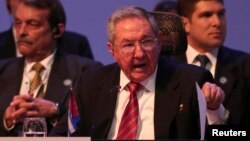Cuba will not accept any interference from the United States, President Raul Castro said Wednesday, warning that meddling in its internal affairs would make rapprochement between the two countries "meaningless."
His comments came after U.S. Assistant Secretary of State Roberta Jacobson, the highest-ranking U.S. government official to visit the island in nearly 40 years, last week met with dissidents a day after talks with Cuban government officials.
"Everything appears to indicate that the aim is to foment an artificial political opposition via economic, political and communicational means,'' Castro told a summit in Costa Rica. "If these problems are not resolved, this diplomatic rapprochement between Cuba and the United States would be meaningless.''
However, Castro made it clear he was committed to the talks, despite his concern that Washington might try to foment internal opposition within Cuba through greater telecommunications access and the Internet.
He also urged President Barack Obama to use executive powers to ease a decades-long embargo against Cuba, saying Washington could extend measures like those announced for telecoms to other areas of the economy.
Obama's new policy specifically singled out telecoms in Cuba as an area that Washington is willing to allow U.S. companies to invest in, and for its part, Havana has said it is ready to let that happen.
Castro reiterated that he has no plans to budge from Cuba's single-party political system, although observers say that does not rule out the possibility that independent politicians might be given space to run for election in the future.
Castro said Obama's decision to hold a debate in Congress about eliminating the embargo was "significant," adding he was aware that ending it "will be a long and hard road."
The United States and Cuba held historic high-level talks in Havana last week that are expected to lead to the re-establishment of diplomatic ties severed by Washington in 1961.
Obama needs approval from the Republican-controlled Congress to completely normalize relations with Cuba, and Republicans such as Florida Senator Marco Rubio have opposed engagement as long as Cuba maintains a one-party state, represses dissidents and controls the media.





